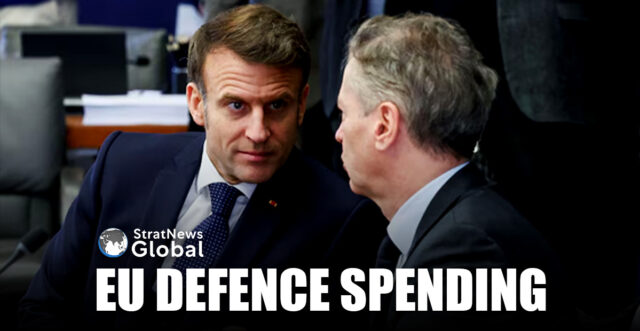European Union leaders on Monday agreed to enhance their defence against Russia and other emerging threats by increasing spending and addressing gaps in military capabilities.
“A lot has been done already but we need to do more. We need to do it better, stronger, faster – and we need to do it together,” Antonio Costa, the president of the European Council of EU leaders, said after a summit on defence in Brussels.
However, the European Union leaders left largely unanswered the question of how their planned surge in defence spending would be paid for.
Defence Spending Already Boosted
European countries have already ramped up defence spending in recent years, in response to Russia’s 2022 invasion of Ukraine and a growing view that they cannot rely so much on the United States to protect the continent in years to come.
Their efforts have been fuelled by questions about U.S. President Donald Trump‘s commitment to the NATO security alliance and by his demands for European nations to spend more on the continent’s defences.
The start of the EU summit was overshadowed by Trump declaring at the weekend that he will soon impose tariffs on imports from the EU, having ordered similar measures on goods from Canada and Mexico – which were paused on Monday – and from China.
Critical Defence Gaps
The EU leaders agreed to focus on filling critical gaps in their defences such as air and missile defence, missiles, ammunition and military transport, Costa told reporters.
The leaders discussed how such priorities could be funded but did not reach a detailed agreement. The European Commission, however, agreed to look for flexibility in rules it oversees on EU countries’ public finances to make defence spending easier.
“Europe needs, basically, a surge in defence. And for that, our defence industrial base must be strengthened,” European Commission President Ursula von der Leyen told reporters after the summit.
“For many, many years, we have under-invested in defence. Thus there’s a great urgency to increase the defence spending with a big magnitude,” she said.
NATO Secretary General Mark Rutte and British Prime Minister Keir Starmer also took part in the Brussels talks.
Spending Hike
Last year, EU countries spent an average of 1.9% of GDP on defence, or about 326 billion euros ($334.5 billion) – a 30% increase on 2021, according to EU estimates.
But many EU leaders have said they will need to spend even more. The Commission, the EU’s executive body, has estimated the bloc may need to spend an extra 500 billion euros over the next decade to fill the critical gaps in European defences.
Trump has said NATO’s European members should spend 5% of GDP on defence – a figure no member of the alliance including the United States currently reaches.
Potential Defence Financing Options
Von der Leyen and Costa said the EU had several potential defence financing options, including national spending, an expanded role for the EU’s European Investment Bank and private capital.
Leaders avoided directly addressing in public the politically sensitive question of whether the EU should issue joint debt to pay for defence spending.
Diplomats say borrowing to finance loans rather than grants for military projects may be a possible compromise.
(With inputs from Reuters)





